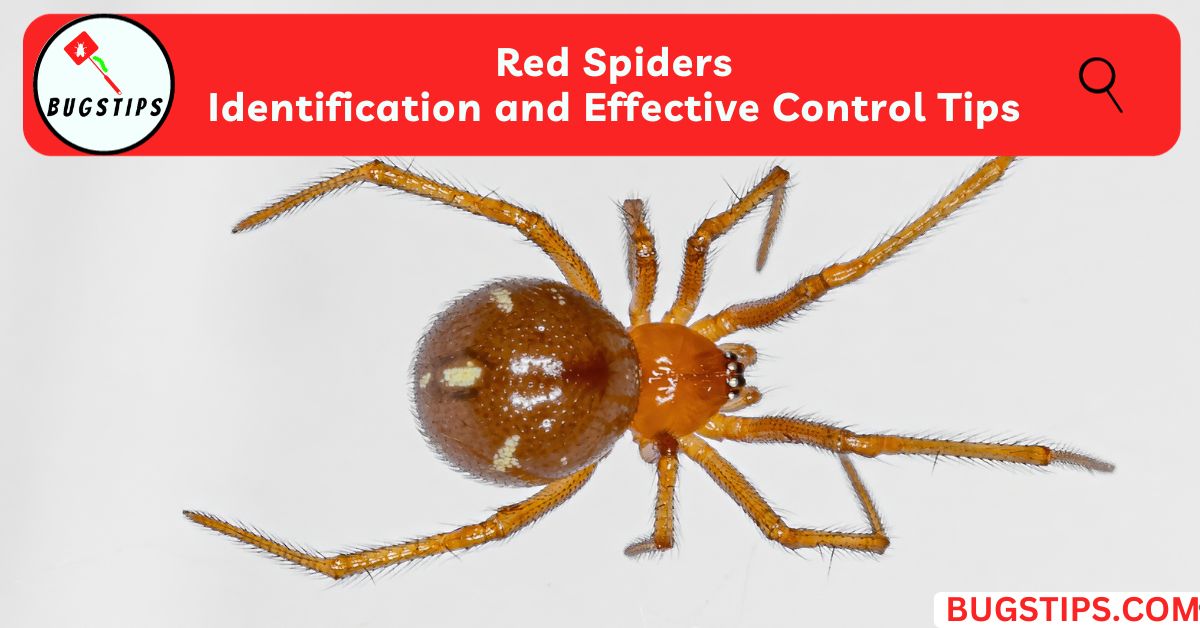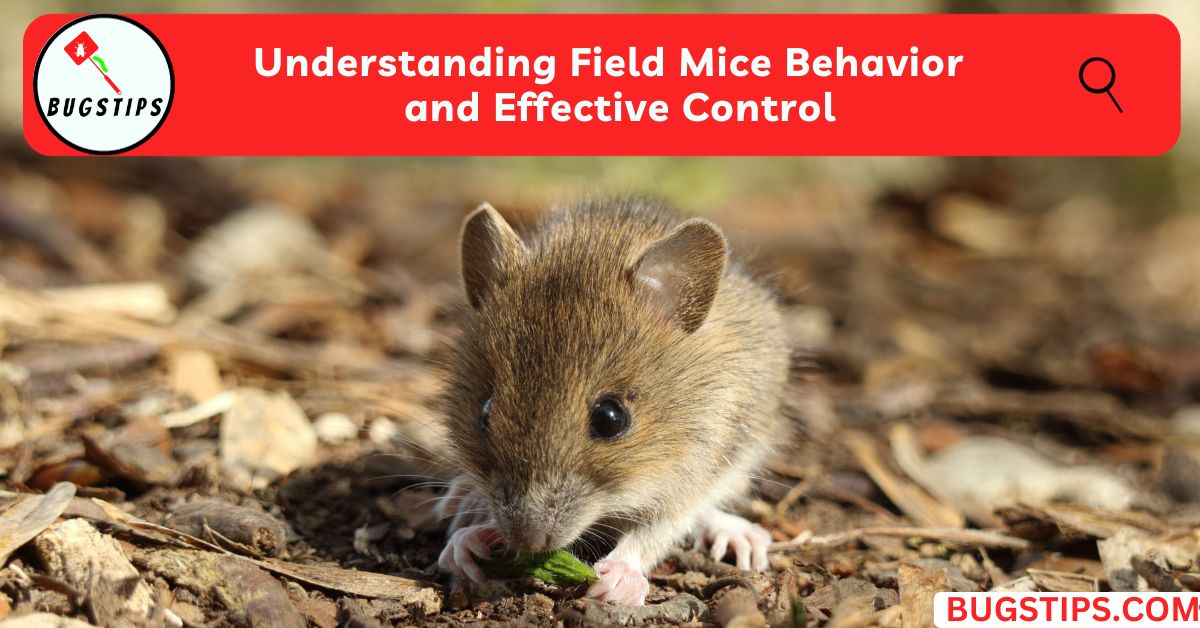This post may contain affiliate links which means as an Amazon Associate, this site may earn a small commission on qualified purchases made through links at no extra cost to you. Learn more on Affiliate Disclosure
Cockroaches are infamous pests that can invade our homes and survive even in the harshest environments.
But despite their resilient reputation, cockroaches are living creatures with many similarities to humans and animals. One thing they share with us is the need for sleep and rest.
In this article, we will explore the sleeping habits of cockroaches and answer common questions like Do cockroaches sleep? How can you tell when they are sleeping? Where do they prefer to catch their Zzzs? What are their sleep cycles like?
Understanding how cockroaches sleep can provide helpful insight for controlling these crafty insects and keeping them from infesting our homes.
Let’s look closer at the slumber patterns of these nighttime invaders!
Do Cockroaches Sleep?
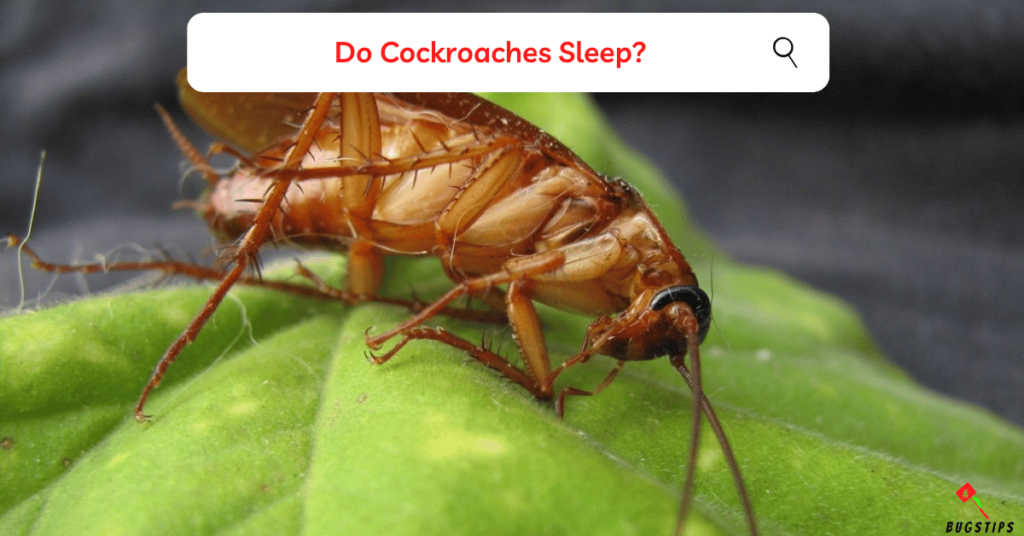
Yes, cockroaches do sleep, but not in the same way humans do. Cockroaches follow a circadian rhythm with periods of activity and rest over a 24-hour cycle.
They have active periods where they are moving around and inactive periods that serve as their “sleep”.
Cockroaches tend to be most active in the middle of the night. Their activity levels are lower during daylight hours.
After their peak activity period at night, cockroaches enter a resting state of immobility that resembles human sleep.
During their sleep phase, cockroaches remain very still, cease moving their limbs and antennae, and their metabolism slows down.
This period of inactivity allows their bodies and minds to recharge after being active at night. Without adequate rest, cockroaches would be unable to function properly.
You May Also Like – Bugs in Mailbox | 10 EASY Ways to Keep Them Out
How Do You Know If a Roach Is Sleeping?
Determining if a cockroach is sleeping can be tricky since they don’t sleep exactly like us.
However, some clear signs indicate a roach is in a resting or sleeping state.
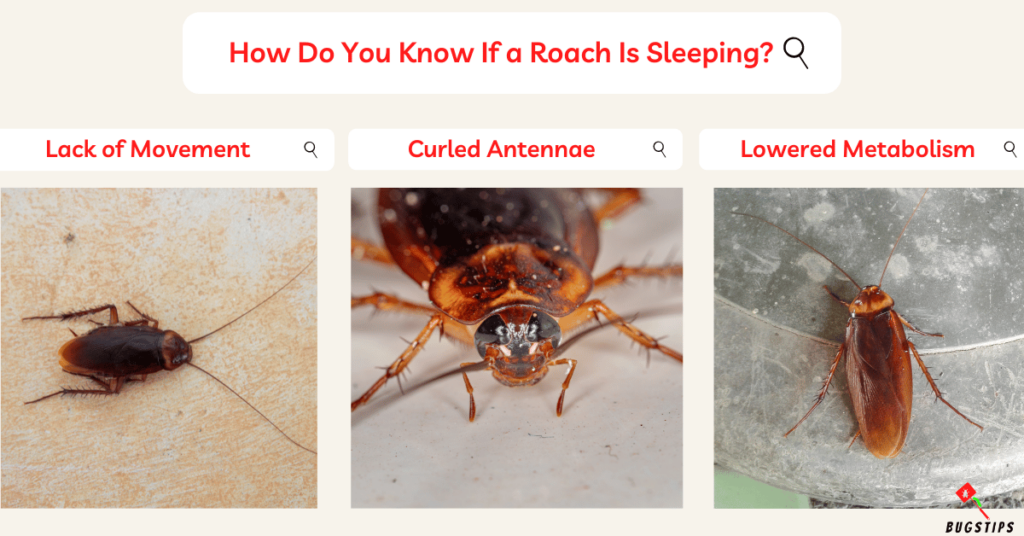
Lack of Movement
- A conked-out sleeping cockroach will be completely still – no walking, no wriggling, no antennae waving.
- If you spot any twitching of the legs or the body, it means the roach is still awake.
Curled Antennae
- Next, peek to see if its antennae are curled backward under or over its body rather than sticking outwards.
- This curled antennae position is a sure giveaway that the roach is in sleep mode.
Lowered Metabolism
- To be sure, you’d have to look for slowed breathing and metabolism.
- But let’s be practical – we can’t actually see a roach’s breathing or metabolism! Still, lethargic movements can be a sign of sleep.
You can also gently poke it with a stick or something similar. Some roaches play dead, so a sleeping one won’t react to a light prod. A waking roach will scurry away quickly!
Related Article – Do Cockroaches Play Dead?
Do Cockroaches Sleep on Their Backs?
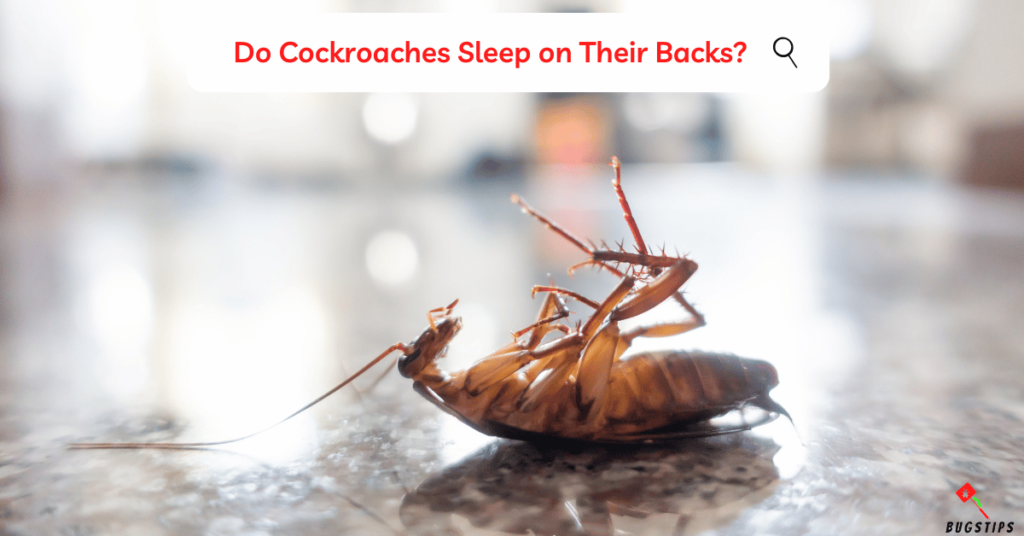
No, cockroaches do not sleep on their backs. Cockroaches never flip over onto their backs during sleep like some mammals do.
When sleeping, cockroaches remain firmly positioned on their feet with their bellies pressed flat against the surface they are on. They tuck their legs beneath their bodies when sleeping rather than sprawling out.
Related Article – Do Dead Cockroaches Attract More?
The reason cockroaches don’t end up on their backs when sleeping is due to how their legs and bodies function.
A cockroach’s legs move in a wave-like motion powered by their triangular-shaped femurs. Their joints only move forward and backward, unlike human joints that rotate in all directions.
This anatomy means it is physically impossible for a cockroach to flip itself over onto its back. If a cockroach was forcibly turned upside down, it would be unable to right itself back onto its feet.
Cockroaches only sleep right-side up with their bellies and feet touching the ground. You will never find a cockroach snoozing on its back.
Their specialized legs and underbellies keep them firmly planted in their sleeping spots instead of rolled over as a dozing dog or cat might be.
You May Also Like – Can Cockroaches Swim?
Where Do Cockroaches Sleep?
Cockroaches are masters at hiding, so it can be tricky locating exactly where they sneak off to sleep. When it’s time to sleep, cockroaches look for areas that provide darkness, warmth, humidity, and seclusion.
Here are common places where cockroaches sleep.
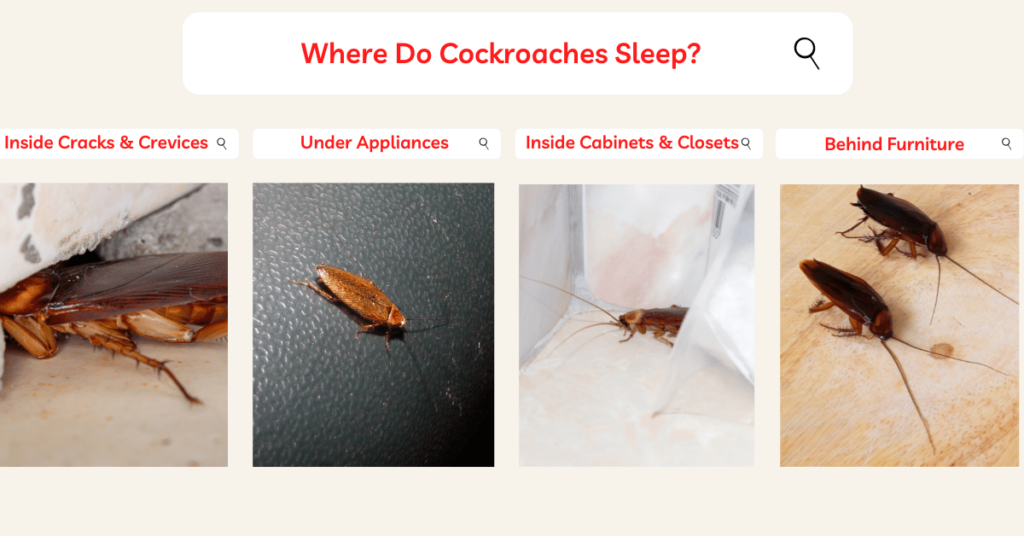
Inside Cracks and Crevices
- Cockroaches love to wedge themselves into tight spaces like cracks in walls, floors, furniture, appliances, etc.
- These narrow crevices let them sleep concealed and undisturbed.
Under Appliances
- The warm, humid environment under fridges, stoves, and dishwashers makes the perfect dark hiding spot for snoozing roaches.
Inside Cabinets and Closets
- Kitchen cabinets, pantries, wardrobes, and storage closets allow cockroaches to tuck away out of sight for daytime siestas.
Behind Furniture
- Areas behind desks, dressers, bookshelves, and other furniture are appealing to roaches seeking darkness and seclusion for sleeping.
Knowing where cockroaches like to sleep can make it easier for you to get rid of them!
Related Article – How to Easily Get a Cockroach Out of Hiding
When Do Cockroaches Sleep?
Cockroaches are nocturnal, meaning they are most active at night. During the daytime, cockroaches sleep.
Light triggers cockroaches to seek shelter where they can hide and rest undisturbed. When the sun rises in the morning, cockroaches retreat to their secluded sleeping spots, where they remain inactive throughout the day.
Cockroaches emerge again under the cover of darkness. They become active and search for food and water sources once night falls.
Their peak activity times are early nightfall and a few hours before dawn.
How Long Do Cockroaches Sleep?
Cockroaches need between 8-9 hours of sleep per 24-hour period. However, they don’t get this sleep all in one long session.
Cockroaches sleep for short bursts ranging from 20 minutes up to a few hours sporadically throughout the daylight hours.
They cycle between brief periods of sleep and activity while tucked away safely in their hiding spots.
The exact total sleep time and patterns vary slightly between different cockroach species.
But in general, a cockroach will sleep for a combined 8-9 hours spread out over short naps during the day before becoming active again at night.
Related Article – Squish a Cockroach or Step on One?
Do Cockroaches Sleep More In the Winter?
Cockroaches do tend to sleep more during the colder winter months compared to warmer seasons.
There are a few reasons for their increased sleep times in winter.
- Lower temperatures make cockroaches more lethargic and sluggish. The cold essentially forces them to sleep more to conserve energy.
- With fewer food sources available outdoors, cockroaches have less need to be active foraging in winter. Longer sleep sessions help reduce their energy requirements.
- Colder weather and snow cover outdoors mean cockroaches really can’t leave the shelter. So they pass the time by sleeping in their hidden indoor havens.
- Shorter winter days provide more hours of darkness. Cockroaches match their biological clocks to be awake more at night.
- Reduced mating behaviors and reproduction in winter also lessen their activity, allowing more time for sleep.
While cockroaches don’t hibernate the same way some mammals do, their sleep and activity patterns definitely shift with the seasons.
The cold winter temperature and environment make cockroaches drowsier overall, leading them to sleep more daily than during warmer active seasons.
Their winter lethargy helps conserve precious energy until conditions improve.
Related Article – Do Ticks Die in the Winter?
Do Cockroaches Bite You In Your Sleep?

Fortunately, cockroaches do not intentionally bite or feed on humans, whether asleep or awake. However, some roach activity can lead to what resembles bites.
Cockroaches have chewing mouthparts and can bite if provoked, trapped, or handled. But they do not seek out human blood or skin as a food source.
Roaches prefer to eat waste and human food scraps.
However, the prickly legs and antennae of cockroaches can scrape or puncture skin if they crawl over you in bed.
Some people are allergic to roach saliva, droppings, or decomposing bodies and can react with itchy bumps or rashes.
While cockroach activity indoors can cause annoying and uncomfortable skin irritation, actual insect bites are rare.
They do not parasitize humans or intentionally bite us for food. Irritation is more likely from contact with bristly legs and residue rather than aggressive biting behavior.
Practicing good sanitation and controlling roach infestations helps prevent unwanted encounters with cockroaches while sleeping.
This minimizes irritation and allows more peace of mind under the sheets.
Related Article – Cockroach in My Room Can’t Sleep: 10 Proven Tips
Will Sleeping With the Light on Keep Cockroaches Away?
Sleeping with lights on will deter cockroaches to some extent but is not an effective solution alone.
Cockroaches prefer darkness, so having lights on does discourage them from scurrying around exposed areas.
However, determined roaches can still come out cautiously if hungry enough. And lights being on all night are disruptive to your sleep!
You can try using nightlights or focused lights around problem areas like pantries or kitchens.
This may reduce some roach activity without lighting up your entire home. But crafty cockroaches will still be able to hide out undisturbed in cracks and crevices.
For lasting results and better sleep, you need integrated pest management using sanitation, traps, gels, and sealing up entry points.
Selective lighting can be part of this strategy, but it shouldn’t replace proper prevention and removal of roach infestations.
So while lights make your home less hospitable to cockroaches, they won’t effectively keep these persistent pests away from you all night.
You May Also Like – How Many Legs Do Cockroaches Have?
Final Thoughts
Cockroaches require sleep just like humans and other animals do. Their nocturnal nature means they sleep during the day, often hiding away in secluded spaces. Cockroaches follow circadian rhythms with periods of rest and activity.
Understanding when and where cockroaches sleep can actually help homeowners control infestations.
Disrupting their daytime harborages when they rest can be an effective pest management strategy.
While we may view them as pests, cockroaches are simply trying to fulfill their natural needs.
Appreciating their sleep behaviors provides insights that allow us to deal with them in smarter, more effective ways.
FAQs
Do roaches sleep at night or during the day?
Cockroaches are nocturnal and sleep during the daytime. They are most active at night when they search for food.
How do cockroaches sleep?
Cockroaches sleep for short periods throughout the day, totaling 8-9 hours. They sleep in hidden spots like cracks and under appliances. When sleeping they are motionless with curled antennae.
Do roaches sleep more in winter?
Yes, cockroaches tend to sleep more in the winter months. The cold weather makes them more inactive and lethargic, so they sleep longer to conserve energy until temperatures warm up.
Resources – (for further reading)
Oklahoma State University – Cockroaches’ Increasing Metabolic Rate with Rising Temperatures
University of Minnesota Extension – Cockroaches


